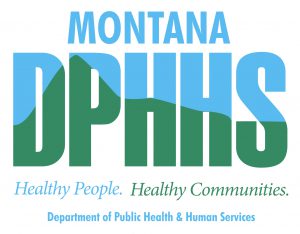Montana Disability and Health Brochure

A partnership of the Montana Department of Public Health and Human Services
and The University of Montana Rural Institute
Recently, there has been an explosion of interest in the health and wellness of people with disabilities. From some perspectives, this relatively new area of concern represents the most significant disability development since the Americans with Disabilities Act passed in 1990.
In our rural state, economic, disability, rehabilitation and health care resources are scarce and must reach people dispersed over large areas. The use of public health resources offers an important way to reduce the risk and prevent or manage secondary health conditions and associated need for acute care.
Who We Are
Montana Disability and Health Program (MTDH) is a partnership of the Montana Department of Public Health and Human Services (MDPHHS) and The University of Montana Rural Institute.
For 20 years, this partnership has involved Montana’s service organizations and people with disabilities in collaborative efforts to improve the health of Montanans with disabilities.
Montana is building on these efforts through the Montana Disability and Health Program: Living Well Under the Big Sky.
Our Goals
The long-term goals for the Montana Disability
and Health Program are to
-
Improve the health of people with disabilities
- Prevent and manage secondary health conditions
- Eliminate health disparities experienced by people with disabilities
For more information, Montana Disability and Health Program Strategic Plan.
Living Well With A Disability
With Montana’s four centers for independent living (CILs), we are conducting Living Well with a Disability, a 10-week, peer-facilitated, health promotion workshop.
Living Well with a Disability (LWD) teaches skills to
- Link health to quality of life
- Set goals and solve problems
- Manage frustration and discouragement
- Seek information
- Develop and maintain healthy relationships
- Eat well and be physically active
- Advocate for oneself and for systems change
- Maintain healthy lifestyle changes
National research shows LWD to be cost-effective at reducing limitations associated with secondary health conditions.
Contact MTDH or your local CIL to implement or participate in a Living Well with a Disability workshop in your community.
Nutrition
Materials Supporting Education and Nutrition in Adults with Intellectual or Developmental Disabilities
(MENU AIDDs) coordinates practice guidelines, support and education materials, and methods of evaluation to improve food and nutrition in group homes. Program results include high resident and staff satisfaction, improved menu quality, and better weight management.
MTDH is partnering with the MT Developmental Disabilities Program and Community providers to implement MENU AIDDs statewide.
Accessible Formats
When a print product is mad available to the public, alternative formats are useful to people with disabilities. MTDH works with Public Health Programs to produce materials in large print, Braille, audiotape, and text files for screen-reader software.
Accessibility Ambassadors
MTDH recruits, trains and supports state disability leaders to assess and improve accessibility. Ambassadors educate housing stakeholders about “Visit-ability” as a design strategy to improve the accessibility of private homes and neighborhoods.
Disability Advisors
We recruit, train, and support disability advisors to participate in MDPHHS advisory groups, and to integrate disability and health into public health planning and evaluation. Click here for Guidelines.
Women’s Health
Women with disabilities can face barriers to accessing healthcare, education and services. MTDH supports the CDC’s Right to Know Campaign.
MTDH also supports Women Be Healthy (WBH), a curriculum designed for women with intellectual
and developmental disabilities. WBH works with clinics and community partners statewide.
Call to Action
The U.S. Surgeon General’s Call to Action to improve the health and wellness of people with disabilities
“This call to Action encourages …
- Health care providers to see and treat the whole person, not just the disability;
- Educators to teach about disability;
- A public to see an individual’s abilities, not just his or her disability; and
- A community to ensure accessible health care and wellness services for persons with disabilities.”
~Surgeon General Richard Carmona
http://www.equalrightscenter.org/site/DocServer/Ill_Prepared.pdf?docID=561
Montana Disability and Health Program
A partnership between Montana Department of Public Health and Human Services
and The University of Montana Rural Institute
Funded by Centers for Disease Control and Prevention Grant #5U59DD000287-04
RTC: Rural, The University of Montana Rural Institute: A Center for Excellence in
Disability, Education, Research and Service, 52 Corbin Hall, Missoula, MT 59812-7056
888-268-2743 or 406-243-4956, 406-243-4200 TTY
meg.traci@mso.umt.edu




